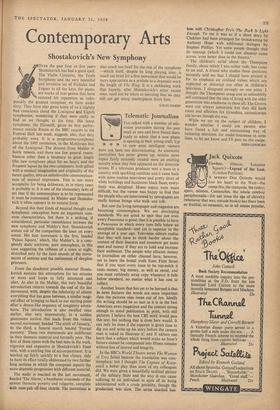Telematic Journalism
I'VE talked with a number of tele- vision journalists during the past week or two and have found them ready to admit that a new phase is opening in their young craft. Up 0 0 0 to now even intelligent viewers have not been too discriminating. As cinematic journalism has never grown up, serious news topics fairly seriously treated were an exciting novelty when they first appeared on the domestic screen, If a television producer sent a team to a country with sparkling sunshine and it came back with some routine interviews and pretty shots of white buildings and handsome black faces, every- body was delighted. Home topics were more difficult, but the viewer was happy to find that the people who are interviewed by newspapers are really human beings who walk and talk.
But now the living newspaper and magazine are becoming commonplace. We are developing standards. We are quick to spot that not even every Panorama is good; that it is possible to have a Panorama in which every item falls below an acceptable standard—and yet is superior to the average of a year ago. Television editors realise that they will have to think harder about the content of their features and somehow get more men and money if they are to hold and increase their audiences. The people who allocate money to journalism on either channel have, however, yet to learn the brutal truth from Fleet Street that if you want every issue to be top-notch it costs money, big money, as well as sweat, and you must ruthlessly scrap copy whenever it falls below standard, no matter what it has cost to collect.
Another lesson that has yet to be learned is that in news features the words are more important than the pictures nine times out of ten. Ideally the writing should be as taut as it is in the best American news magazines and the content strong enough to stand publication in print, with still pictures. I believe the best CBS work would pass this test; but nothing that is done here would. It can only be done if the reporter is given time to dig out and write up his story before the camera man is asked to illustrate it; and if editors can learn that a subject which would make an hour's feature cannot be compressed into fifteen minutes without loss of interest and integrity.
In the BBC's World Theatre series The Women of Troy failed because the translation was com- monplace; but I thought The Captain of Koep- enick a better play than most of my colleagues did. We were given a beautifully satirical picture of the military State and the may it can cause suffering to an individual in spite of its being administered with a crude geniality, though the production was slow. The series touched bot- tom with Christopher Fry's The Dark Is Light Enough. To me it was as if a short story by Chekhov had been arranged for broadcasting by Anthony Hope with additional dialogue by Stephen Phillips. Yet some people thought that its message (which I could not discern) came across 'even better than in the theatre.'
The children's serial about the Thompson family, about which 1 was rather rude, has come to an end. A friend who studies these questions earnestly told me that I should have praised it for its emphasis on civilised values which are neglected or distorted too often in children's television. I disagreed strongly on one point. I thought the Thompsons smug and so unhealthily self-contained that the idea of living with the older generation was anathema to them all. The Groves were not always admirable but they did have room and affection for Grandma, cantankerous old bosom though she was.
While we are on the subject of children, I wonder whether I could ask parents who have found a fair and unpunishing way o( rationing television for under-fourteens in term time, to let me know and I'll pass on the recipe.






































 Previous page
Previous page